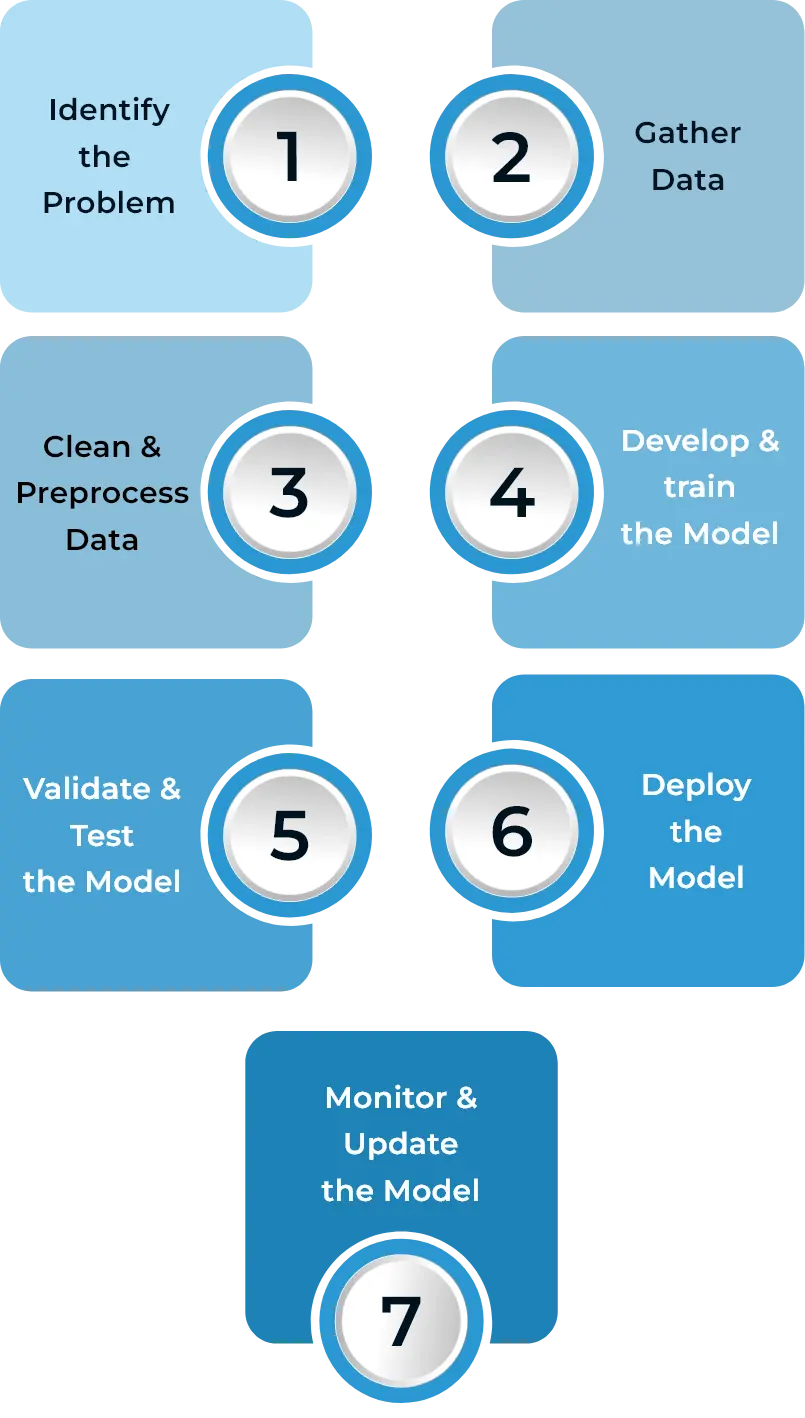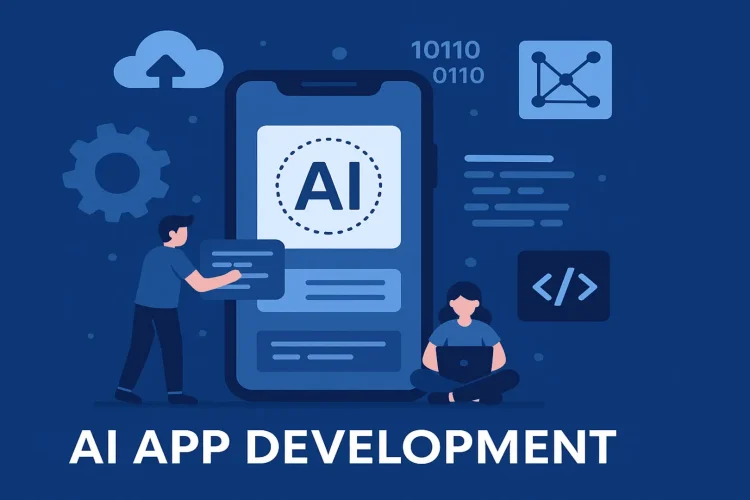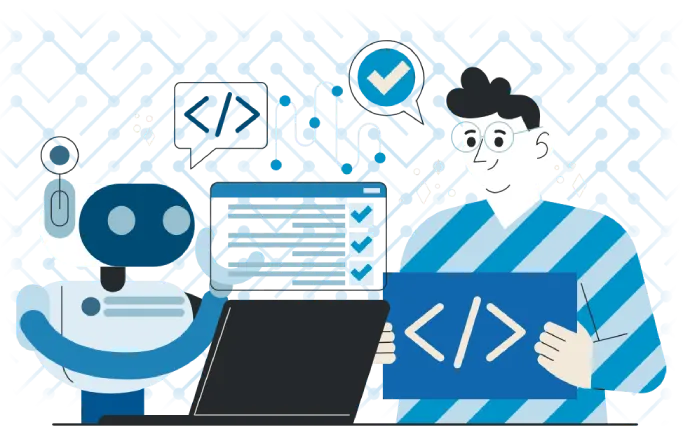0
Founded
Year
0+
Achieved
Awards
0%
Clients Recommend Us
0+
Core
Team
0+
Projects Implemented
0%
Business Efficiency with AI
Our Adaptive AI Development Services
-
Consulting and Strategy Development
- Understand your business needs and create a clear plan for using AI.
- Develop smart strategies to use AI for better results and growth.
-
Custom Adaptive AI Model-based Solutions Development
- Build models with tools like Gemini 2.0 and neural networks to solve your unique challenges.
- Create AI-powered solutions, including predictive analytics and customer-friendly chatbots.
-
Enterprise Integration
- Add Adaptive AI to your existing systems to improve productivity.
- Help automate repetitive tasks, improve workflows, and enhance customer interactions.
-
Data Engineering
- Use advanced technologies like Apache Spark and BigQuery to manage data securely and efficiently.
- Keep your data safe and use it to power smarter business decisions.
-
Maintenance and Upgrade
- Fix issues quickly and keep your systems running smoothly.
- Add new features regularly to make sure your tools stay ahead of your business needs.
-
AI Strategy Assessment
- Check how well your AI tools and platforms are working and make them better.
- Align AI solutions with your long-term business goals for maximum success.
Our Technical Expertise in Adaptive AI Development

Machine Learning
- Use supervised, unsupervised, and reinforcement learning techniques to solve complex problems.
- Integrate learning tools or platforms into your existing systems to improve efficiency.

Deep Learning
- Build intelligent models using tools like Gemini 2.0 and neural networks.
- Create systems that keep learning and deliver smarter results every time.

Natural Language Processing (NLP)
- Develop chatbots and virtual assistants to improve communication and customer service.
- Use NLP for language translation, text analysis, and customer feedback insights.

Computer Vision
- Create tools for tasks like image recognition, object detection, and scene understanding.
- Use frameworks like TensorFlow to ensure high performance in vision-based systems.

Cloud Computing
- Expertise in cloud platforms like Microsoft Azure, Google Cloud Platform (GCP), and Amazon Web Services (AWS).
- Secure deployment of adaptive AI solutions with scalable, cost-efficient cloud infrastructure.
- Enable real-time access to datasets and AI models through cloud-based APIs.

Predictive Analytics
- Build AI tools that predict market trends and help with smart planning.
- Use methods like decision trees and random forests to turn data into actionable insights.
Our Adaptive AI Systems Development Process


1. Problem Identification
- Understand the specific challenges your business faces and identify how AI can address them.
- Define clear goals and outcomes to ensure the AI solution aligns with your business objectives.
- Assess competitive benchmarks to ensure the solution provides a unique edge in your industry.
- Use real-time feedback from stakeholders and clients to refine problem definitions before moving forward.
2. Data Gathering
- Collect data from internal sources like company records and external sources such as public datasets.
- Ensure the data is relevant, clean, and sufficient for training the AI model.
- Leverage data streams from IoT devices and live systems for real-time applications.
- Implement advanced data filtering tools to exclude unnecessary or low-quality information.
3. Data Cleaning and Preprocessing
- Remove duplicate or inconsistent data and address missing values to improve accuracy.
- Transform the data into a format that is optimized for AI model training.
- Automate data preparation with AI-driven preprocessing tools for faster and more efficient workflows.
- Include data augmentation techniques to enhance training data, particularly for image and NLP tasks.
4. Model Development and Training
- Develop AI models using advanced algorithms tailored to your business needs.
- Train the models using structured datasets and industry-standard tools.
- Integrate frameworks like Gemini 2.0 and cutting-edge neural networks for better learning capabilities.
- Use federated learning to train models on decentralized data without compromising privacy.
5. Model Validation and Testing
- Validate model performance through rigorous testing to ensure accuracy, reliability, and scalability.
- Address identified gaps by fine-tuning the model to achieve optimal results.
- Perform stress tests using synthetic datasets to evaluate model behavior under extreme conditions.
- Introduce explainability tools (e.g., SHAP or LIME) to make model predictions more transparent for stakeholders.
6. Model Deployment
- Deploy the AI model in a production environment with minimal disruptions.
- Integrate the model seamlessly into existing systems, including web or mobile platforms.
- Utilize containerization tools like Kubernetes or Docker or others to ensure scalable deployment.
- Include multi-cloud support to enhance accessibility and prevent downtime during operations.
7. Model Monitoring and Updates
- Continuously monitor the AI model’s performance using analytics dashboards and monitoring tools.
- Regularly update the system with new data and feedback to improve its accuracy.
- Implement automated alerts for potential performance issues to enable proactive intervention.
- Schedule regular re-training of the model to ensure relevance as data patterns and business needs evolve.
Our Adaptive AI-based Development Services Cater to a Wide Array of Industries
-
Banking and Finance
- Use Adaptive AI for fraud detection and smarter financial advice.
- Help businesses manage risk more effectively.
-
Retail
- Improve inventory management with smart AI tools and customized platforms.
- Create targeted marketing campaigns that connect with customers.
-
Healthcare
- Use AI to diagnose medical issues earlier and provide personalized care.
- Help healthcare professionals work faster and better.
-
Supply Chain and Logistics
- Plan delivery routes more efficiently using AI.
- Manage inventory in real-time to reduce waste.
-
Insurance
- Use AI tools to speed up claims processing and improve pricing models.
- Add chatbots for faster customer service.
-
Automotive
- Create smarter self-driving car systems.
- Use AI for predictive vehicle maintenance and voice assistants.
-
E-commerce
- Personalize shopping experiences and suggest products to customers.
- Use real-time data to adjust prices and stock for higher profits.
-
Telecommunications
- Use AI to manage networks more efficiently.
- Add chatbots to improve customer service for technical issues.
Our Adaptive AI Development Services
Our Expertise in AI Models

GPT-4
OpenAI’s GPT-4 sets the benchmark for complex problem-solving with its advanced reasoning and extensive general knowledge. It excels in tasks like nuanced text generation, summarization, multilingual communication, and creative ideation, making it a versatile tool for various industries.

GPT-4o
This advanced multimodal model excels at processing text, images, and audio, offering businesses versatile applications for communication and automation.

LLaMA 2
Meta’s LLaMA 2 is a state-of-the-art large language model designed for high-performance AI applications. It supports customization, enabling businesses to tackle challenges like content generation, problem-solving, and text summarization with precision.

PaLM2
Google’s PaLM2 leads the way in intricate reasoning tasks, such as code interpretation, mathematical solutions, and multilingual translation. It’s the perfect model for enterprises looking to enhance productivity through AI-powered insights and operations.

Claude 2
Anthropic’s Claude 2 offers a safer and more ethical generative AI approach. It is ideal for organizations prioritizing compliance, privacy, and responsible AI while delivering powerful text analysis, summarization, and conversational capabilities.

Gemini
Gemini, Google DeepMind’s latest model, combines text, image, and speech processing into a seamless multimodal AI platform. Its ability to integrate and process diverse data types makes it perfect for advanced applications in marketing, healthcare, and customer experience.

MidJourney v6
MidJourney v6 revolutionizes visual creativity with its ultra-realistic image generation capabilities. From marketing campaigns to product design, this model offers high-quality, detailed visuals that cater to the growing demand for impactful visual content.

DALL.E
OpenAI’s DALL·E generates stunning and lifelike images from text prompts. It supports businesses with image creation, modification, and variation, offering unparalleled versatility for industries like e-commerce, media, and design.

Whisper
Whisper by OpenAI provides exceptional speech recognition capabilities, including language identification and multilingual speech-to-text conversion. It’s a key tool for transcription services, voice-based applications, and real-time communication tools.

OpenAI Sora
OpenAI’s new text-to-video AI model enables businesses to generate high-quality videos from text prompts, perfect for marketing campaigns, e-learning platforms, and creative workflows.

ImageBind
Meta’s ImageBind integrates text, audio, video, and other modalities to deliver rich, cross-domain insights. It is particularly beneficial for industries like retail, logistics, and marketing, enabling a unified understanding of complex datasets.

Stable Diffusion
Stable Diffusion remains a powerful image generation model, excelling in tasks like inpainting, outpainting, and creative image synthesis. Its scalability and efficiency make it an excellent choice for businesses seeking high-quality visual outputs.
Our Adaptive AI Development Technology Stack
AI Development Services

Python

.NET Core

Java
AI Development Tools

Jupyter / Anaconda

Colab

Kaggle
Cloud Computing Platforms

AWS

Azure

Google Cloud
DevOps

Synk

JFrog

Jenkins
Frameworks / Libraries

Tensor Flow

PyTorch

Keras
Data Storage & Visualization

Big Query

Power BI
Tableau
Our Engagement Models
-
Dedicated AI Development Team
Our proficient AI and blockchain developers are fully immersed in leveraging cognitive technologies to provide exceptional services and solutions to our clients.
-
Extended Team Enrichment
Our extended team model is thoughtfully designed to support clients in expanding their teams with the necessary expertise for AI-driven projects.
-
Project-focused Strategy
Embracing our project-based approach, our skilled software development specialists collaborate directly with clients and the triumphant realization of AI-infused projects
Get Started Today

Contact Us
Complete our secure contact form, Book a calendar slot and set up a Meeting with our experts.

Get a Consultation
Engage in a call with our team to evaluate the feasibility of your project idea. We’ll discuss the potential, challenges, andopportunities.

Receive Cost Estimates
Based on your project requirements, we provide a detailed project proposal, including budget and timeline estimates.

Project Kickoff
Upon agreement, we assemble a cross-disciplinary team to initiate your project. Our experts collaborate to launch your project successfully.
Start a conversation by filling the form
Build your top-notch AI product using our in-depth experience. We should discuss your project.
FAQs about Adaptive AI Development Company
Impressions

Jun 25, 2025
Global SaaS Momentum: A Strategic Imperative for Your Business
The global software-as-a-service (SaaS) market is growing faster than ever before. It is quickly changing how businesses operate. Experts predict its value will be over 100 billion dollars in many key areas by 2035. This means a huge chance for smart companies like yours. This growth is more than just trends or popular words. It […]
Read more
Jun 23, 2025
Future of Apps: Combining LangChain Smartness with Flutter Speed
Software innovation is happening at a fast pace. Businesses are not looking for pretty apps anymore. They are looking for apps that can think, learn, and improve the interaction of users with them right away. This demand is generating a new type of design that unites smart features with effectiveness. That is where LangChain and Flutter […]
Read more
Jun 19, 2025
Can Small Businesses Benefit from AI Application Development?
AI application development is no longer a futuristic concept exclusive to Silicon Valley giants. It’s here, and it’s more accessible than ever before. From customer service automation to inventory forecasting, artificial intelligence is reshaping how businesses operate and grow. The big question is: Can small businesses truly benefit from AI application development? The short answer […]
Read more

































